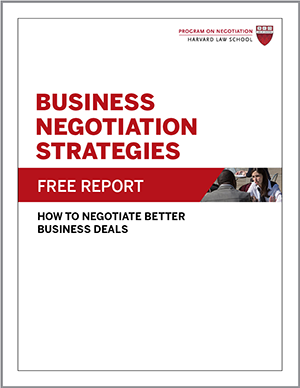
Business negotiations require intensity and focus. Unfortunately, the level of focus required to work through complex issues with our counterparts across the table often leads us to forget about the importance of selling the deal to outsiders.
As the following examples suggest, outsiders often manage to gain power in negotiation and play an outsized role:
- In October 2023, Chevron announced it was buying energy company Hess Corp. for $53 billion. A few months later, Axios reported that Exxon and Chinese national oil company CNOOC believe they have the right to block the deal, saying they have a right of first refusal on some of Hess’s holdings. As of February 2024, Chevron said “constructive discussions” aimed at closing the deal were ongoing.
- In late 2022, street improvements spearheaded by New York City mayor Eric Adams, including new bus lanes and bike and pedestrian infrastructure, reportedly were being thwarted by the Mayor’s Office of Intergovernmental Affairs, according to Streetsblog NYC. The department had become “far more deferential to opponents of projects—and less effective at negotiating solutions,” sources told the blog.
- In February 2024, Capital One announced its intention to purchase Discover in a $35.3 billion all-stock deal—with the combined company expected to be the largest holder of credit card loans. But would U.S. regulators scuttle the deal on antitrust grounds?
These examples illustrate the importance in dealmaking of looking beyond the parties at the negotiating table to consider how other interested parties—including existing clients, customers, and partners; government entities; and the public at large—might view the agreement. Let’s take a closer look at how you can go about selling the deal to outsiders.
1. Broaden Your Perspective
When preparing for an important negotiation, consider the various outside parties that could be affected by an agreement. This list might include members of your organization or your counterpart’s organization; clients and customers on both sides; public-interest groups; and government agencies.
Next, consider the interests of these relevant parties in the negotiation. What might please or displease them about the outcome you’re envisioning? How might they respond if they are displeased by your negotiation process or outcomes? Is there a risk they could create problems for you or those you represent?
Rather than viewing such parties as potential deal blockers, think about what valuable perspectives they might offer. What important issues might they bring to the negotiating table? Should any of them play a role in the negotiation?
Even if you decide that an interested party shouldn’t have a direct role in your talks, you might decide to keep them apprised of your progress so that they can offer feedback. You could also launch separate negotiations with outsiders on issues that concern them. Finally, you might consider whether any parties should have the right to vote on or veto any negotiated agreement you might reach—essentially, turning outsiders into insiders.
2. Discuss the Risks of a Busted Deal
Despite your best efforts at selling the deal to outsiders, they may be upset by your negotiated agreement. If so, they may act impulsively to try to thwart the deal. What they may fail to consider is that their attempted sabotage could backfire on them as well, including in the form of missed opportunities, a damaged reputation, or bad press.
Try to highlight the risks of attempted sabotage before they have a chance to move ahead with such plans. Reminding outsiders of the potential downsides of trying to block your deal could motivate them to negotiate a mutually beneficial agreement with you.
3. Work Around the Spoiler
What if, despite your best efforts at selling the deal to outsiders, a key player seems determined to remain a roadblock? If so, it may be time to try a work-around, writes Harvard Law School senior fellow Robert C. Bordone. A work-around is a strategic approach to reaching your goals by circumventing a deal spoiler.
One type of work-around involves building coalitions that exploit what Harvard Business School professor James K. Sebenius has termed patterns of deference, or the common tendency of people to follow influential others on a particular path. By bringing respected parties on board, you may be able to build a coalition in support of your plan that the spoiler will find difficult to resist.
If a department head in your organization remains opposed to your negotiated agreement, for example, try to identify other players who might influence her in your favor. Then encourage them to make your case. If the potential spoiler sees that you are supported by people she admires and respects, her resistance may wane. Because such efforts can backfire, however, when selling the deal to outsiders, you should be careful to enlist only those you know and trust to make your case.
What other advice do you have for selling the deal to outsiders?




